A few numbers for comparison
Women in Germany are nowadays educated like never before. The ratio of women between 30 and 34 that held an academic degree became for the first time in 2006 equal to men's: 36 percent. Women in this age group overtook men since then. By 2015 more than half the women between 30 and 34 held a degree, but only 43.11% of the men.
Education Level and Position According to Gender
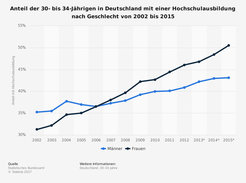
It has been observed for years that around half of first-year students are women, with very slight fluctuations. The sudden rise in the ratio of male freshmen in 2011 can be attributed to the abolishment of conscription that year. In total, more and more people of both genders pursue academic degrees.
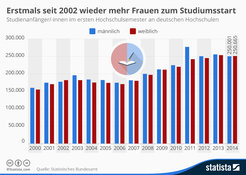
However, the good education that women enjoy is only marginally reflected in their positions at companies, universities and research institutes. The following graph indeed shows that women are still underrepresented in leadership positions.
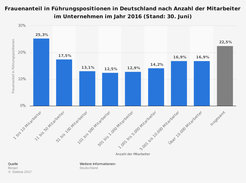
In academia, too, women are not represented in equal ratios to men at each hierarchical level. Although in 2016 more than half of first-year students were women, their ratio decreases steadily at higher educational and hierarchical levels. While 45% of PhD students are women, their ratio sinks to 30.4% of academics who undergo habilitation. At the professor level, only 23% are women, and a mere 11.6% of full professors (C4).
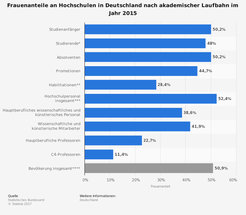
On a positive note, the ratio of women has risen continually from only 9.9% in 1999 to 23% in 2016.
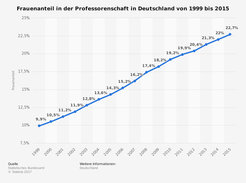
Situation in Biological Science
According to a survey of the Federal Statistical Office in 2017, biology was placed at number 15 among the most popular study disciplines in winter semester 2015/2016.
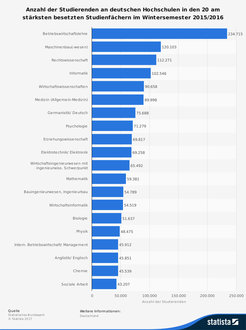
Biology students in Germany
The Federal Statistical Office did not only survey the most popular disciplines in total, but also according to gender. Biology reached the tenth place of the most popular disciplines among female students. Of a total of 51,637 students, 32,569 were female and 19,068 male. With 63%, female students constituted more than half of the students.
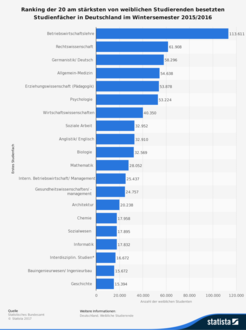
Situation at our Institute
Despite the current overrepresentation of female students in biological studies in German academia, their ratio decreases — as detailed above for industry and universities — at out institute in a position-level-dependent manner.
While the ratio of female PhD students at our institute stands at 54%, it sinks to 38% for post-doctoral fellows. 28% of the research groups at the institute are led by women. We currently have three male directors.
The reasons for this are manifold: from male-dominated networks and subliminal discrimination of women, via temporary contracts, which make family planning difficult, or the lack of female role models, to a still complicated reconciliation of family and research.
We have made ourselves acquainted with this situation, analyzed it, and embarked on an effort to eradicate gender-specific obstacles where possible. We follow at all levels an equal-opportunity policy.
The Max Planck Society as well as our institute have already developed numerous measures that we expect will help us overcome gender-specific obstacles.






